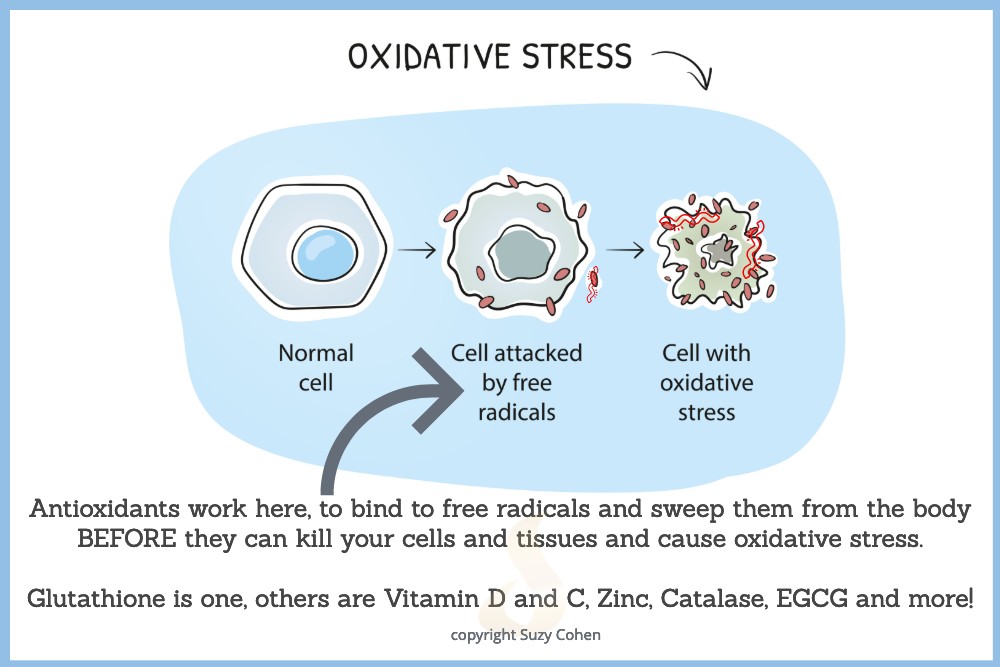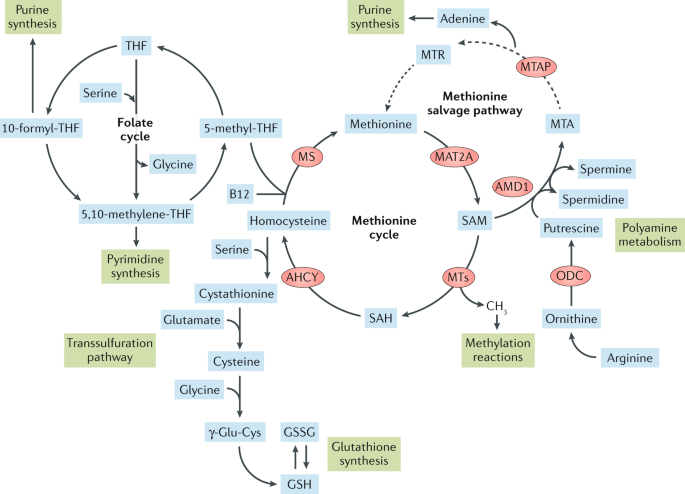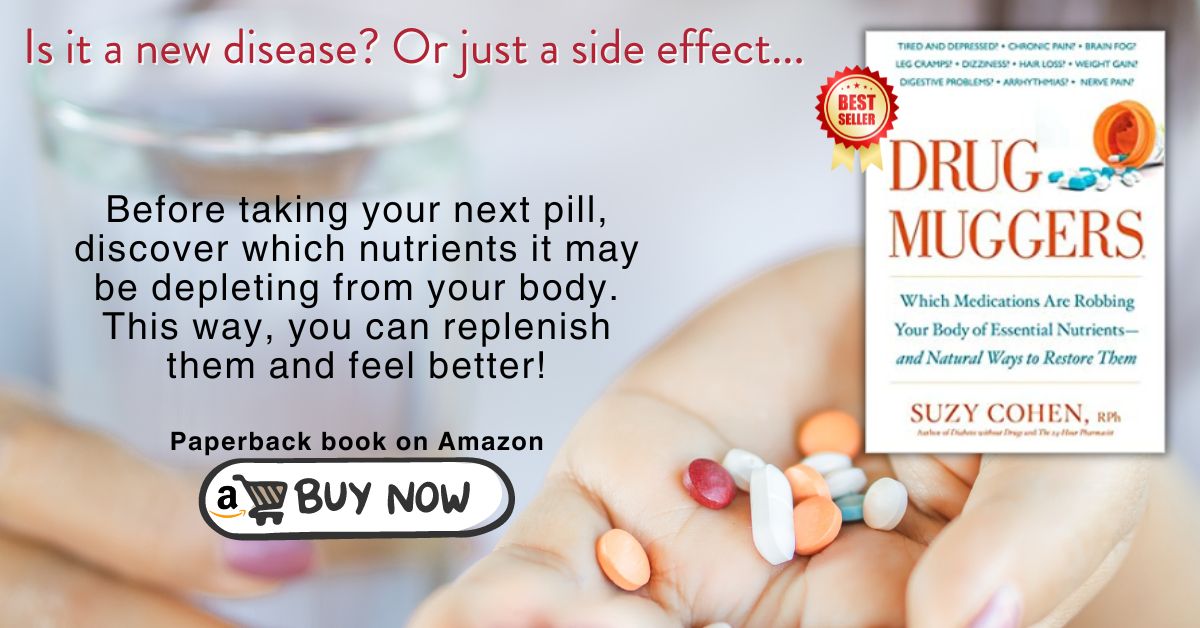What's On This Page?
ToggleWhat if you were taking an over-the-counter med for something simple, and it was stripping you of an important antioxidant? Would you want to know?
What if I told you the antioxidant in question was glutathione, which keeps your liver healthy, and detoxifies poisons from your bloodstream. You would want to know right, so you could restore levels of glutathione with supplementation.
Glutathione is made in the body, inside your cells, and your liver cells have the highest concentration. Glutathione is found in the cell fluid (cytoplasm) as well as organelles like your mitochondria so it’s not just a liver antioxidant, it an all-over “master” antioxidant. Glutathione is often referred to in scientific literature as GSH, which is short for “glutathione S transferase.” So if you see me refer to GSH below, I’m still talking about glutathione.

Scientists have found a way to stabilize and protect glutathione, such that it’s available in some high-quality dietary supplements, sold nationwide at health food stores. This is one powerful antioxidant that reduces oxidative stress from toxins, heavy metals, pathogens and hepatotoxic medications.
It may even help with skin conditions such as psoriasis, and it helps support liver problems. Most notably, alcohol-related liver injuries and non-alcoholic fatty liver may respond to glutathione. Special forms like the acetylated forms of glutathione (S-acetyl glutathione or SAG) are known to penetrate the brain directly by going past the blood-brain barrier, and can positively impact neurological conditions, especially Parkinson’s disease.
Sometimes SAG is used in autoimmune diseases that have a neurological component involved. Simply put, SAG cleans the brain and regular GSH supplements clean the body.
Recently, a friend who has my book Drug Muggers, Which Medications are Robbing Your Body of Essential Nutrients and Natural Ways to Restore Them, asked me to explain how certain medications deplete glutathione from the cells. He wasn’t able to find studies on pubmed to correlate with all the medications I listed in the chapter for glutathione. He was just trying to see for himself, and confirm that my list was accurate.
And he’s correct, there is not a direct study to substantiate every single drug I listed because I’m thinking several metabolic steps ahead of the actual depletion. I listed drugs using conceptual reasoning to make sure that you, the reader, would know all potential avenues of glutathione depletion, even if it occurred due to the suppression of cysteine, or other amino acids and cofactors necessary to synthesize glutathione intracellularly.
By the way, glutathione (GSH) is made up of not only cysteine, but also glycine, and glutamate amino acids. It’s created in the cells and requires all 3 of these components in order to be made. So anything that suppresses any of those 3 amino acids is a drug mugger of glutathione in my book!

The studies available to us today that prove a direct cause for GSH depletion are available but not for every single medication that suppresses this antioxidant. What I can tell you is that many, many drugs (and even some lifestyle factors) have the capability of ruining your body’s master antioxidant production, and it’s because they hinder precursor nutrients that are required for glutathione production.
When I wrote Drug Muggers, I was thinking two steps ahead because to me, if a precursor metabolite was interfered with, such as cysteine, then that would potentially (actually probable) deplete its downline metabolite glutathione. Perhaps theoretical as far as studies go, but to you and your health, this type of “drug mugging” is still practical and applicable for supplementation.
If you don’t have all the recipe ingredients available to you, you can’t cook up glutathione intracellularly. To make GSH, it requires three different amino acids, cysteine being the primary one, as well as other essential nutrients.
Why Glutathione Gets Depleted: Transsulfuration and Methylation
Today, I’ll share with you the common sense reasoning behind the list of drugs I’ve included in my book, so you can understand why GSH gets depleted, and why you should restore this nutrient.
I’ll keep it as simple as possible. In the human body, you have many complex metabolic pathways, and one of them is called the transsulfuration pathway which makes cysteine. You need vitamin B6 for the transsulfuration pathway to produce cysteine. Anything that depletes or blocks B6 utilization or intestinal absorption hinders the production of cysteine, which is required to make glutathione.
If you wish to, look at images of the “Methionine-Homocysteine Cycle” so you can see all the nutrients required to go through those enzymatic pathways and create glutathione. This happens trillions of times a day, it’s a spinning cycle of different gears and each gear needs to be well-oiled with nutrients or the spinning stops temporarily. That’s bad for your health!
You have another important process or “gear” that protects your DNA and helps you make biologically active methylfolate (which is not the same as folic acid). This process is called the methylation pathway and it requires natural folate. Anything that interferes with the methylation gear, also interferes with glutathione production.
How Probiotic Deficiency Depletes Glutathione
Finally, you have gut microflora (what you might think of as probiotics), and these are useful for producing vitamin B12 in your body. If you take any medication that upsets the balance of probiotics in your gut, your whole microbiome is negatively impacted, and you can’t effectively make glutathione. So anything that interferes with your GI health also suppresses your ability to synthesize GSH.
In my best-selling book Drug Muggers, I’ve listed all medications that interfere with vitamin B6, methylfolate and B12 because if any of those are suppressed, your ability to make glutathione is hindered. The reason is because you need B12 to effectively produce cystathionine, which then forms cysteine, which then goes on to form glutathione.
Having deficient amounts of B12 may not technically ‘deplete’ your stores of glutathione in the literal sense of the word, because it doesn’t use up the glutathione. But having a deficiency of those B vitamins will in essence, reduce glutathione, because you can’t make the precursors for it, which is the same thing in my world. A B12 deficiency may mean that you still need to restore levels of glutathione with supplements.
Here’s a list of medication categories that impact levels of glutathione, and my reasoning behind it:
How Acid Blockers and Antacids Deplete Glutathione.
These medications severely impact the human gut microbiota. They suppress absorption, or block production of the entire B complex family, especially B12. They suppress mineral absorption too, including zinc. If you have reduced zinc, you will be hindering the downline production of glutathione. Furthermore, there is a direct impact for some people. The chronic use of acid-suppressing drugs may cause serious gastric oxidative injury to the mucosa. This in and of itself will deplete available glutathione stores quickly.
How Analgesics Deplete Glutathione.

The medications listed in my book including Fioricet and Tylenol #3 all contain acetaminophen which can deplete GSH stores. This is well known in the medical community. If you take a medication that contains “acetaminophen” and it is over-the-counter, or prescription, you still need to be supplementing with some glutathione.
I hope your physician has told you that. If not, please pose the question because glutathione is directly depleted by acetaminophen a.k.a. paracetamol in other countries.
How Antibiotics Deplete Glutathione.
These life-saving medications are sometimes taken for more than 14 days, and if that’s the case, you can expect a total disruption of your gut flora. The antibiotics shoot pathogens with a shotgun like effect, thus killing the good bacteria along with the bad ones. They cannot differentiate because they are a bit stupid! So chronic use of antibiotics of any kind will deplete probiotics, which then suppresses B12 which then means the transsulfuration “gear” is cramped, and now you can’t make glutathione.
How Alcohol Depletes Glutathione.
This beverage will directly impact glutathione levels and reduce them. Drinking even a glass of wine each night will deplete glutathione, so it’s a good idea to supplement.
How Antiviral Drugs Deplete Glutathione.
Some of the HIV antiviral drugs are known to reduces B12 (which is needed for the methylation gear) as well as cysteine. This means that production of glutathione is hindered, so supplementation is important. The HIV infection itself is also known to suppress GSH.
In this ARTICLE, we see the drug nutrient depletions by AZT, a commonly used medication and vitamin B12 is found to be reduced. Vitamin B12 deficiency in HIV infected persons appears to be more common among those patients taking AZT which means that glutathione production will be suppressed too. Furthermore, the use of N acetyl cysteine or NAC (a direct precursor to glutathione) is protective against AZT side effects.
The NAC isn’t working directly, it’s working because it goes on to form glutathione!
Also this STUDY shows that AZT can cause glutathione deficiency directly. So the take home message is that if you’re using AZT, or similar, you should probably be taking a glutathione supplement, but of course ask your doctor if he/she minds and show him these and other available studies.
How Nicotine and Smoking Depletes Glutathione.
Smoking increases one’s risk for cardiopulmonary disease over a lifetime, but the exact mechanism is multi-factorial. What we do know is that there’s a lot of oxidative damage to the lungs, and other tissues. We also know that smoking reduces C. So chemicals found in cigarette smoke cause depletion of C. It’s a known drug mugger of vitamin C, which is required for proper glutathione production and utilization.
I’ve listed smoking (nicotine) in my book because there are millions of smokers who need to know that indirectly, glutathione is depleted. Restoring this liver enzyme is important to your health. Many smokers already know that C is depleted, however, they may not realize that glutathione (GSH) production is also suppressed and supplementation is potentially useful.

Suzy Cohen, has been a licensed pharmacist for over 30 years and believes the best approach to chronic illness is a combination of natural medicine and conventional. She founded her own dietary supplement company specializing in custom-formulas, some of which have patents. With a special focus on functional medicine, thyroid health and drug nutrient depletion, Suzy is the author of several related books including Thyroid Healthy, Drug Muggers, Diabetes Without Drugs, and a nationally syndicated column.



